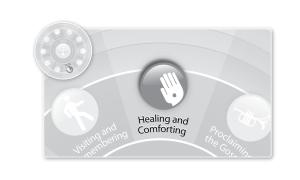Part XIII of our series on Healing and Comforting
 In Friday’s post, we came to an important realization about the relationship between prayer and Healing and Comforting: healing comes to the sick as much as it comes through the sick. That means we should all be praying together – healthy and sick – about all that God wants us to – our illness and everything else. This realization gives special insight into the James 5:13-16 passage we discussed earlier this month. Recall that the elders—representing the church—are summoned to the home of the sick to pray. When they arrive, they are to anoint the sick person with oil.
In Friday’s post, we came to an important realization about the relationship between prayer and Healing and Comforting: healing comes to the sick as much as it comes through the sick. That means we should all be praying together – healthy and sick – about all that God wants us to – our illness and everything else. This realization gives special insight into the James 5:13-16 passage we discussed earlier this month. Recall that the elders—representing the church—are summoned to the home of the sick to pray. When they arrive, they are to anoint the sick person with oil.
Why? Does the oil heal?
As Pastor Brian Croft notes in his blog post, “Should Pastors Still Anoint with Oil When Praying for the Sick?”, the oil serves a spiritual purpose, not simply a medicinal one:
There is a New Testament connection with the Old Testament anointing of oil as a setting apart of someone for God’s blessing and spirit to come.
This ought to remind you of what we talked about in our first week discussion about illness and the Christian: For the Christian, one is either healed for God’s glory (i.e., to mirror the redeemed physical body to all creation as a sign of God’s intention that the physical creation be freed from sin, illness, and death) or one bears illness for God’s glory (i.e., to mirror the fellowship of his suffering to all creation—Christ’s bearing of sin, illness, and death for our redemption). Either way, there is a calling involved. And that calling is signified by the anointing with oil.
Sickness, in other words, doesn’t turn you into an object of pity. It sets you apart for special purpose—mirroring into the world Christ’s sufferings and his bearing up under them in love, focusing on God in the midst of one’s own misery, and saying hour after hour, day after day, as Jesus did on the Cross in Luke 23:46, “Into your hands I commend my spirit.”
Doing that when you’re sick is hard—impossible, really, by human standards. That’s why the church created hospitals and why the church sent elders to the bedsides of the sick. They prayed the hours together.
That’s something that we need to stress about James 5:13-16: It doesn’t describe a one-time process, i.e., “If any of you is sick, pray one time. Let the elders pray one time.” That’s why it’s important to keep James 5:17-18 in view as well:
17Elijah was a man(AE) with a nature like ours, and(AF) he prayed fervently that it might not rain, and for(AG) three years and six months it did not rain on the earth. 18(AH) Then he prayed again, and heaven gave rain, and the earth bore its fruit.
It might sound like Elijah prayed one time and the rain stopped and then prayed one time and it started. But if you read 1 Kings 18:41-45, you’ll see that James is commending persistence in prayer.
Elijah prayed seven times! Hopefully that reminds you of the Psalm 119 which says, “Seven times a day do I praise you.”
You see, the point of James 5:13-18 is not “Pray hard when you’re sick. If you’re righteous, God will heal you.”
It is “Are you suffering? Keep praying the hours. Are you joyful? Keep praying the hours. Are you sick? Keep praying the hours, and call the elders of the church to come pray with you and anoint you for the special calling that comes with illness: either the calling of mirroring God’s healing to the world, or the calling of mirroring the fellowship of his suffering. Pray the hours like Elijah did, throughout the day. Prayer that is bigger than your suffering and your joy and your needs will bring healing and transformation and righteousness. So keep praying!”
Sum it up and say: Biblically, we don’t pray in order to be healed. We pray because we are healed—in the most fundamental healing of all, which is salvation from sin and death.
Illness threatens to derail our prayerfulness, so we treat it with special care, supporting one another by praying with—not just for—each other when one of us is sick. And we pray not only for our bodily healing, but we also pray the Psalms and Scriptures, and in this way we are healed—of our own propensity to fold in on ourselves and to live life—including the suffering of illness—separate from God: The original sin.
So how do you need to change your prayers – for yourself or a loved one – in light of this?










